Even if you’ve never seen the 1987 Arnold Schwarzenegger sci-fi action classic Predator, you’ve probably seen this scene: A musclebound Arnold grins slyly as he saunters toward an equally brawny Carl Weathers. The two men clasp their hands together in the center of the room, creating a thunderous clap that resounds even as director John McTiernan holds his camera on their rippling, bulging biceps.
It’s a very manly moment from a very manly movie, the first of three (and soon to be four) entries in a very manly franchise. Even when Arnold and Weathers cede the series to actors not known for their massive physiques (Danny Glover in 1990’s Predator 2 and Adrien Brody in 2010’s Predators), and even when women get to play a more active role (Maria Conchita Alonso as a tough cop in Predator 2, Alice Braga as an Israeli sniper in Predators), these movies remain fixated on a specific type of exaggerated masculinity. And that sort of makes sense, as the series is about alien hunters who test their might against Earth’s greatest warriors.
But here’s the thing: As much as these movies love their muscles and explosions and outsized weapons, they ultimately make machismo look silly, and sometimes even horrific.
Consider the way the first Predator movie portrays bravado. It begins as a straight-forward action flick, not unlike Arnold’s other ’80s hits: Recruited by Weathers’s CIA agent Dillon to rescue American officials from a Communist base in Latin America, Arnold’s Dutch brings together a team of hardened commandos, including former pro wrestler Jesse Ventura and imposing character actors Bill Duke and Sonny Landham. Throughout this part of the movie, Dillon, Dutch, and the other soldiers repeatedly remind the viewers—and one another!—that they’re the best set of soldiers the U.S. has ever produced, a claim they back up in their attack on the radicals’ base. With catchy one-liners (“Stick around,” a smirking Arnold tells the soldier he just impaled) and copious explosions, our heroes take down the enemy soldiers, breaking only enough sweat to make their muscles glisten.
Like most of the sequences in the movie, the jungle attack scene is supremely entertaining, and McTiernan remains one of the best directors of clear and intelligible action. But it is also thoroughly, unrepentantly over-the-top. And in the same way that stunt men jumping away from explosions always looks exactly like stunt men jumping away from explosions, never to be confused for people actually blown back by concussive blasts, the movie’s celebration of swaggering, muscular men always feels like a joke, never an endorsement of the lifestyle.
For example, early in the movie, we learn of the deep bond between Ventura’s Blain and Duke’s Mac. When Blain becomes one of the first to be cut down by the Predator’s blasts, the film gives Mac a moment of mourning. As a tune approximating “Taps” enters Alan Silvestri’s score, the camera goes low to the ground to watch Mac uncover Blain’s body and get one last look at his partner. Mac takes a solemn sip from the flask they shared before placing it on Blain’s wounded neck, whispering, “Goodbye, bro.”
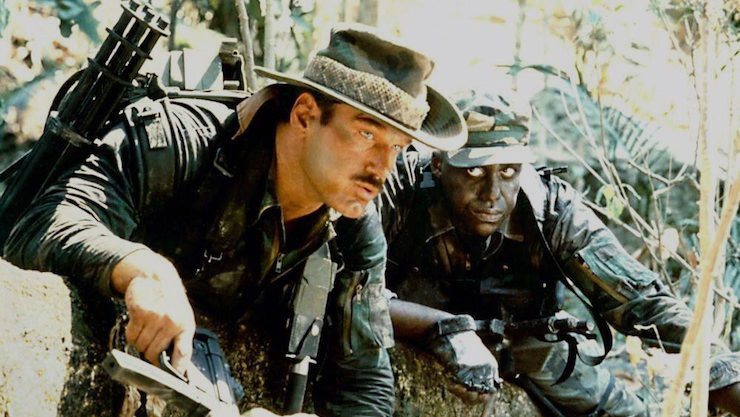
The film later gives Duke a soliloquy, in which Mac’s mourning turns to anger. Sitting under a full moon and recalling the adventures they had together, Duke twists his smile into a scowl, vowing to find the person who killed Blain and “cut your name into him.”
For a moment, the scene carries genuine pathos as it unfolds, largely thanks to Bill Duke’s outstanding performance. But whatever real feelings it invokes, the scene’s verisimilitude quickly gets choked out by the goofy boasting, rendering the entire moment (pleasingly) absurd.
With a film as well made as Predator, it’s hard to tell which jokes are intentional and which are accidental, but one gets the sense that the movie laughs at its swaggering heroes. As the only non-bodybuilding member of Dutch’s team, Hawkins (played by Shane Black, the director and co-writer of 2018’s The Predator) proves his mettle by making crude jokes about his girlfriend’s anatomy, jokes always followed by an impotent explanation. Likewise, when a wounded Blain tells a concerned teammate “I ain’t got time to bleed!”, the macho line is immediately deflated when the camera catches the teammate responding with an unimpressed, “Okay…”
Whatever the intention, most of the bravado inspires more laughter than awe, and Predator’s commitment to genre excesses makes the heroes’ boasting risible and even campy.
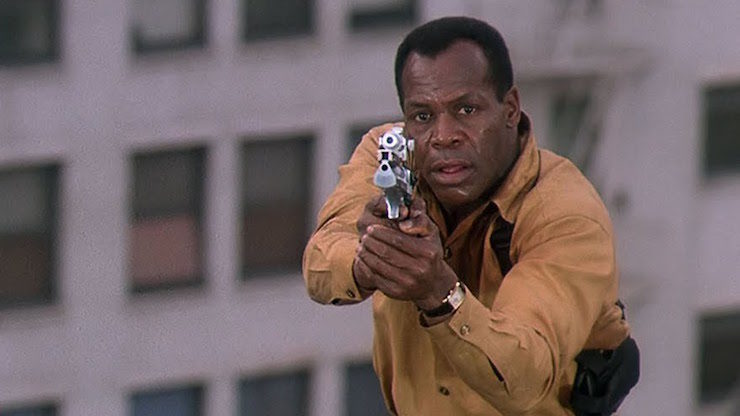
Although it swaps 1980s jungle warfare for the (then) futuristic gang-controlled streets of 1997 Los Angeles, and replaces the first film’s musclemen with Danny Glover, Gary Busey, and Bill Paxton, 1990’s Predator 2 continues the original’s focus on bad dudes with attitude. Glover’s Lieutenant Mike Harrigan may be less built than Arnold, but he’s no less macho when he ignores the laws of the city and of good sense to drive his car into a shootout between a SWAT team and a heavily armed street gang. In dialogue scenes, Glover clearly recalls all the lessons he learned playing Murtaugh in Lethal Weapon (also written by Shane Black), getting into shouting matches with his police chief and refusing to cede jurisdiction to government agents. Harrigan repeatedly tells the viewer that he’s going to do things his way, first to bring down the battling Latino and Jamaican gangs, and then to stop the Predator that’s hunting cop and crook alike.
Theoretically, Los Angeles streets might seem like a more realistic setting than the first movie’s jungle, but the movie’s treatment of gang crime comes right out of tabloid television and conservative stump speeches. The Colombian gangsters carry military-grade weapons that they deploy against helpless citizens, while the Jamaicans kill their rivals in “voodoo” rituals. Gang members hassling a nerdy subway rider find that not only is their target packing a gun, but so is nearly every other rider, from little old ladies to parents with kids. Nothing demonstrates the city’s lawless chaos better than an establishing shot in which director Stephen Hopkins pans across an LAPD station to find punks, prostitutes, and pimps openly fighting against the cops trying to book them. There is no civilization here, and only the strong survive.
By breaking the rules that impede him and staring down gang leaders and a Predator, Harrigan proves that he’s the strongest of all. But as with the previous movie, Predator 2’s milieu is much too silly to be taken seriously. Everything on the screen feels as lurid as the descriptions given by a sleazy newscaster (played by real-life provocateur Morton Downey Jr.)—literally and thoroughly unbelievable. So when Harrigan barrels through a group of gang members or goes toe-to-toe with the Predator, we’re entertained, but we’re not impressed. He’s just one more bellowing cartoon in a city full of bellowing cartoons.
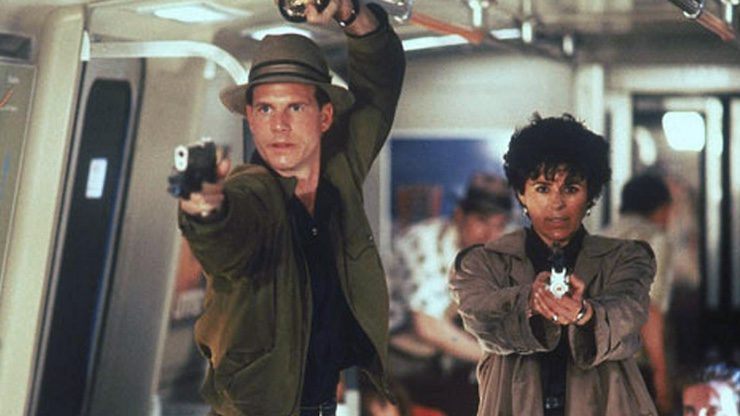
By itself, this over-the-top quality isn’t remarkable, but the movie follows the Predator model by spotlighting its manly characters. Paxton’s cocky Jerry Lambert is all bluster and bragging, from his numerous attempts to hit on Alonso’s Leona Cantrell (she responds by squeezing his testicles and threatening worse) to the battle cry “Let’s dance!” he shouts before lunging at the Predator. Busey’s government agent Peter Keyes hunts the Predator with Ahab-esque determination, expecting to one-up Arnold’s team and secure his supreme manliness.
Predator 2 lacks the overt jokes that the original made about its heroes’ masculinity, but its excesses achieve the same result. The gang war is so flagrantly overdone, Harrigan and Lambert are such larger-than-life movie heroes, and Hopkins’s treatment of police work is so shallow that it’s impossible to take seriously Glover’s final victory, when he beats the Predator in the alien’s own ship. The climactic moment isn’t awe-inspiring—it’s just one more beat in a relentlessly goofy action flick.
On first glance, 2010’s Robert Rodriguez-produced Predators seems to break from its predecessors. In place of the first two movies’ squads is a random collection of tough guys, including American mercenary Royce (Adrien Brody), convicted killer Stans (Walton Goggins), Cartel enforcer Cuchillo (Danny Trejo), Sierra Leone-based soldier Mombasa (Mahershala Ali), and creepy doctor Edwin (Topher Grace). Instead of a terrestrial warzone, Predators takes place on an unidentified planet where Predators gather and hunt prey from Earth, which means that we not only get to see a classic Predator, but a whole host of even more threatening variations. But the biggest difference is its change in tone.
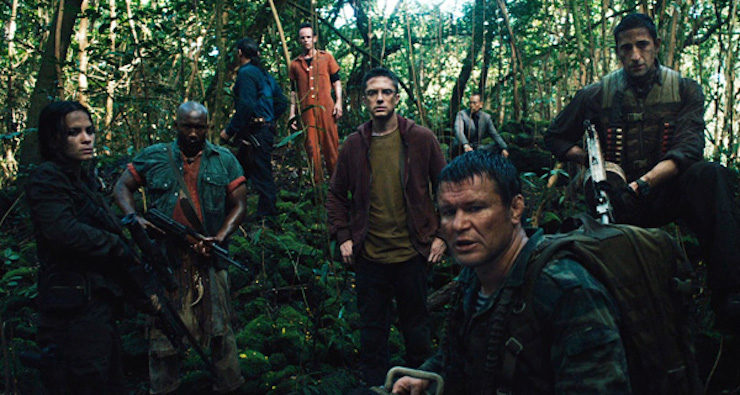
With the beefcake and bravado of ’80s action heroes out of pop cultural favor, director Nimród Antal builds his scenes around shiny CG effects and dour conversations about the nature of violence. Charismatic character actors Trejo, Goggins, and Ali bring humor and flavor to their roles, but most of the jokes come at the expense of Grace’s wimpy doctor, thus constantly reminding us how awesome these guys are, even when they aren’t killing digital monsters. And if these scenes weren’t enough to convince viewers that these characters are dangerous, writers Alex Litvak and Michael Finch make subtext text by having Braga’s IDF sniper Isabelle declare, “We are Predators. We’re just like them.”
To their credit, the writers do give Isabelle more to do than any other woman in the series, and they craft a clear character arc for Royce. He begins the movie cynical and self-centered (when Isabelle asks how Royce understands the Predator’s hunting style, Royce growls, “Because that’s what I would do”), and eventually regains his humanity by caring for his teammates.
But while that might provide some depth for Royce, it does so by invoking familiar gender stereotypes: Royce is a grizzled male loner, while Isabelle is a maternal figure who makes it her responsibility to improve his morals. Furthermore, the arc operates less by Royce seeing or admitting his errors and more by him agreeing with Isabelle’s position, which means that he’s almost always proven right. Most notably, when Edwin gets wounded, Royce ignores Isabelle’s urging to rescue the fallen doctor and abandons them both. He returns for them, but only after Edwin reveals himself to be a serial killer by paralyzing Isabelle with a poison and preparing to torture her. Thus, when Royce comes back, the movie frames him not as someone who has learned a better way, but as a hero whose initial cynicism is proven correct.
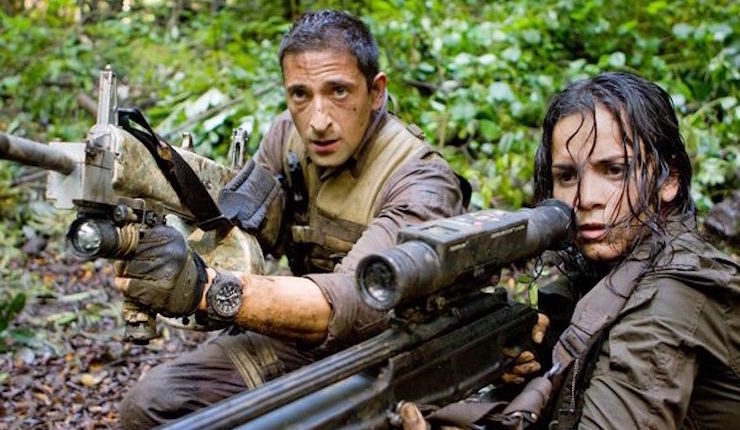
All of this might seem to be an uncharacteristically straightforward endorsement of masculinity in a Predator movie, except for one problem: it doesn’t work. The character progression happens only in leaden conversations between Isabelle and Royce, and the plot mechanics involving Edwin’s reveal as a killer and Royce’s return are labored and nonsensical. Dutch and Harrigan’s adrenaline-fueled one-liners might be gone, but Royce’s ruminations about killing and surviving are no more convincing.
But the biggest strike against Royce’s jock bonafides is Brody’s performance. Known largely for his dramatic and comedic roles, Brody was an interesting choice to lead an action movie, and the actor met the challenge by putting on significant muscle. But while he may look the part, Brody plays the character almost like a parody of Tom Hardy’s Max Rockatansky in Mad Max: Fury Road—growling every line, and punctuating his words with a wince evoking internal struggles.
It’s impossible to take Brody seriously as an ice-cold mercenary—but in that way, Predators follows the other entries. In every Predator movie, no matter how charismatic the actor, no matter how well-staged the direction, no matter how sharp the dialogue, the men come off as silly, pumping their chests to no effect other than laughter.
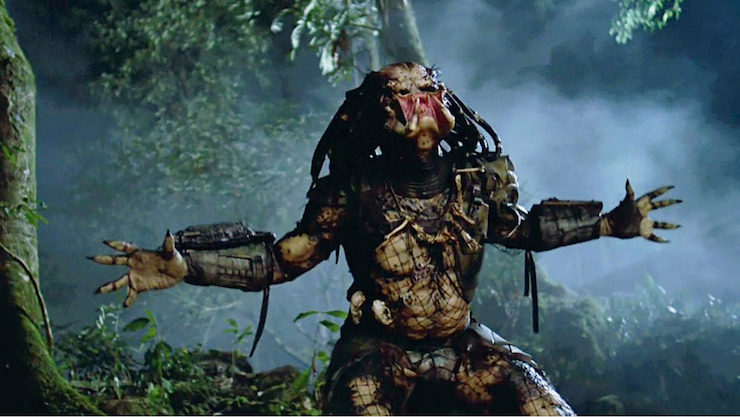
Well, almost no other effect. While the Predator films are action movies, they also feature a heavy dose of sci-fi horror. Every one of the movies have managed to make the Predators terrifying, and the directors’ use of heat-vision POV shots and images of the creatures uncloaking create real tension. We never forget that the Predators are monsters, willing to kill wantonly and to ultimately even destroy themselves to prove their prowess.
Predators may be the only film to directly declare the similarities between the monsters and the heroes, but the idea has been present throughout all the entries in the franchise. When, at the end of Predator 2, a group of Predators reward Harrigan with a trophy for defeating the hunter in his city, they demonstrate that he is one of them, that his manliness is worthy of their monstrosity. When Arnold covers himself with mud to fight the first Predator alone, shouting “Come on! Do it! Kill me!” with wild-eyed belligerence, he’s become just like his foe.
The movies often portray these connections as something to be admired, as if the heroes transcend mere human toughness to become intergalactically manly, but the actual plots undermine this thinking. The Predators may look cool, but they are not to be admired—they’re monsters who find value only in destroying other tough guys, tough guys like themselves. And if they can’t destroy their opponent, they must destroy themselves, choosing annihilation over the loss of alpha male status.
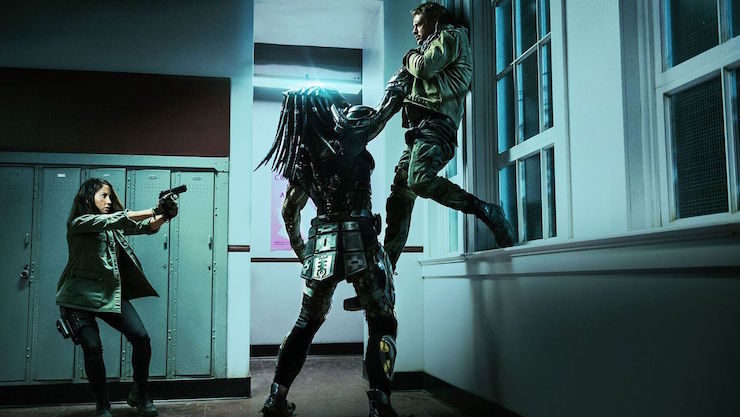
It remains to be seen if the series’ latest entry, The Predator, will continue the franchise’s thematic interest in hyper-masculinity, but events surrounding the film’s production and marketing reveal a problem that extends beyond mere plot points. After learning that director Shane Black gave a small role to Steven Wilder Striegel, a personal friend and convicted sex offender, actor Olivia Munn lobbied to have the scene removed, to which the studio finally agreed. Munn did the right thing by speaking out, but she has not been supported in her bravery. Not only is she being called “difficult,” (implying that she, and not Black, harmed the film) and called a “fake geek girl” (an invective that’s been directed at her since her days co-hosting Attack of the Show), but she has received virtually no backup from her male co-stars.
It’s hard not to see that same pathetic machismo in both Black’s decision to help a man who harmed women and in the male stars’ willingness to let Munn stand alone against a pedophile. The men are protecting each other, holding together as a band of brothers against a threat to their livelihoods, even if it comes at the cost of Munn’s career or the well-being of Striegel’s victim.
In the world of the Predator movies, macho men become laughable or horrifying. In these movies, tough guys ultimately destroy themselves—but we need to be more active to dismantle toxic masculinity in the real world. Supporting people like Munn, who take actual action against actual predators, is a good place to start.
Joe George‘s writing has appeared at Think Christian, FilmInquiry, and is collected at joewriteswords.com. He hosts the web series Renewed Mind Movie Talk and tweets nonsense from @jageorgeii.










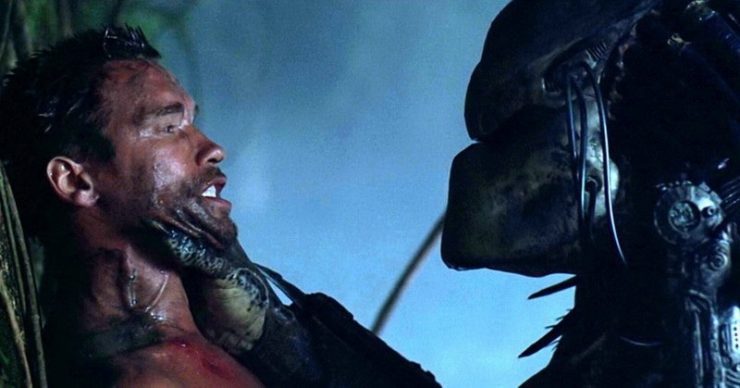
When you start saying that the masculinity portrayed in the great 80’s movies like Predator, Rambo, or Rocky is innately evil you loose me and likely any male younger than 30. Yes masculinity is larger than this (prince was masculine and male as was Micheal Jackson and Richard Simmons) and comprised of multiples, but strong, assertive, protective capable is not evil male or female. Calling it self destructive – I can not agree.
As for the hidden actual plot point – he has obviously served his time in prison which afterwards we are supposed to move on. We give jobs to murderers, thieves, once they are out of prison all the time. We should not treat other criminals any differently – if he is still in some way a threat or is doing bad things now then he should be back in prison. Ostracizing him from society from the rest of his life for what he did (which this article gives no information about and contradicts itself when it says he harmed women and then calls him a pedophile women=children women are adults) is a mistake.
What he did is likely awful and he should have gone to prison for it and he should be watched now but removing the scene from the movie and denying him his livelihood after he has paid his debt to society through prison is not right. America is supposed to be about second changes and reinvinting yourself.
I think the first Predator is a bit smarter than it’s generally given credit for being, especially in regards to the culture of guns and masculinity. Dutch, after becoming aware of the Predator not killing an unarmed woman, and even going so far to knock a gun out of her hands to keep her from being killed by the creature, has to have his weapon blasted out of his hands before he gives it up.
Some may find this moment baffling. (Why didn’t he just put down his gun too?) But I think the screenwriters and McTiernan had something to say there.
#1
Yes, I’ve seen a lot of think pieces about “toxic masculinity” recently. It would be helpful if, at least occasionally, alternatives were offered for men and boys to be masculine via ways that didn’t involve violence and hurting others. Simply labeling something toxic isn’t enough anymore.
@3 Oh I agree we should see more types of masculinity in media and fiction – but to often what people call toxic is simply old ideas of strength, protectiveness, ability and willingness to use violence when necessary and enjoying and engaging in sex (especially with multiple partners and outside of marriage oh no!). This is not the same as going out and raping people or causing wanton destruction for no reason. The supposed moral equivalence between the predators and the people protecting themselves who are being hunted or protecting others who are being hunted is ridiculous.
@2 he doesn’t do it himself because it is his job to protect her. Not because he is male but because he is trained to do so and has been given the job. A soldier should prevent a civilian from picking up a gun and fighting an invader but they should not put down their gun themselves and allow themselves and their charge to be killed.
#1 – I couldn’t agree more with the last two paragraphs of your post. Criminal action is exactly that, and deserves to be punished. Once punished, in accordance with the laws of society, the criminal must be given the opportunity to live a productive life and be successful. Munn’s issues with the actor in question would have been understandable if they had dealt with concerns about personal safety. However, from what I’ve seen about the issue, her demands to remove the completed scene were strictly about retroactively personally attempting to punish the individual for his previous crimes by removing his work from the movie. I can’t blame any of her fellow actors, male or female, for not supporting her in this, and to imply that “macho” behavior in Hollywood is the cause of this lack of support is stretching things well past the point of being reasonable.
#4
Funny, since his team has been completely wiped out at that moment I didn’t think of Dutch as a soldier or a commanding officer anymore but rather a man trying to survive. I never really thought of Anna as a civilian either, since she was disarmed and captured in a guerilla camp and apparently Dillon thinks she has some intel value. But good points nonetheless.
1. dwcole Well said.
I think the writer has missed part of the point of the first movie. 80’s action movies were full of these types of characters. Part of the beauty of the original Predator movie is that it spends the first half of the movie building these men up as the best of the best, to the point that there was one minor injury in the whole base assault, while the second half then puts them up against a foe none of them are prepared for and we see many of them crack. Bill Duke’s Mac is a perfect example of this. He becomes ‘Ahab’ in trying to take the Predator down. Landham’s Sonny is another great one. Going from supremely confident, to spooked, to resigned. The original Predator deserves all the accolades it gets as far as I’m concerned.
Well said. This really puts into words the reason why I never felt like the Predator series resonated with me the same way its “rival” series, Alien, did.
A lot of the time it feels tongue-in-cheek, but it doesn’t really change the fact that the entire theme of the franchise seems to be chest-thumping bros trying to out-manly a beefy space man. Which can be fun! The first movie is a blast. But it feels really shallow and reductive, especially by now.
@3 – There are no shortages of examples of men who avoid toxic masculinity – Obama comes to mind. Wise, respectful to women, kind, loyal, by all accounts faithful to his wife, etc.
And such examples are nothing new – my father, who is 80, has always abhorred violence, found ways to work cooperatively rather than competitively, to speak calmly and kindly, even when upset, etc.
Or that best of all male role models, Mister Rogers.
If you don’t think there are examples of for men other than toxic masculinity, you aren’t looking. Or you’re dismissing examples of non-toxic masculinity as not really masculine, which is a big part of the problem.
#9
No, I’m saying it would be helpful if the folks who write these think pieces occasionally pointed out positive examples, just as you have done here, and I thank you for that. But I would appreciate it if you didn’t try to dismiss my opinion as “part of the problem.” That’s reductive and, frankly, insulting. It was an honest critique of these kinds of articles, which are often so focused on the negative aspects of masculinity they forget the positive ones.
@9 – You realize you lost about 1/2 of the country straight off by citing Obama, right? :)
Things got a bit better when you cited your father, who seems like a nice man. However, while Mr. Rogers was wonderful for a generation of kids, I hope you were firmly tongue in cheek when you cited him as a role model of masculinity.
I’m just curious – why is ok on the PC side to tell men/boys who their role models should be while the message for girls/women is “follow your own path” and “don’t let anyone tell you what you should be”. Can’t we all agree to let children find their own way? On the right, people need to learn to respect those who find their way outside of what has been historically considered “normal”. On the left, people need to learn that the majority of kids will follow the historical “norm”, and the fact that they do isn’t an attack on those that don’t.
Also, I wasn’t specifically talking about men who are positive examples but rather the ways we can teach men and boys to be those examples. That’s a more lengthy examination and an article about the Predator series probably isn’t the best place for it. I just thought it would be helpful if some think piece writer would go that extra mile.
How is Mister Rogers not a role model of masculinity?
He’s a man. He was in a position in the public sphere. He deliberately set himself up to serve as a role model, with his own television program. And he did so as a deliberate answer to what he saw as a lack of appropriate entertainment option and role models for children on television.
To not consider Mister Rogers as a role model is itself an example of toxic masculinity – denying the masculinity of men who defy the expectations of the parts of our culture that are most toxic both to men and done men.
I’d say that Mister Rogers is an example of heroic masculinity, dedicating his life to teaching people to be kinder, gentler and more understanding, in defiance of a culture that glorifies violence in all forms.
I agree 100% with Ursula. Mr. Rodgers is a GREAT role model. And there are many positive examples of masculinity out there. What about Bob Ross, the “Joy of Painting” guy? He served in the Air Force but loved animals and art all his life. I grew up watching “The Joy of Painting” and remember how friendly and kind he always seemed on the show (and also had animals on the show, which I liked as a wee Jaime).
Or heck, what about Superman? (Here I mean the Christopher Reeves Superman, not the various “gritty” versions of Superman in the comics.) He’s a “boy scout” who has dedicated himself to using his powers to help everyone on Earth.
My male partner is another great example of positive masculinity. He respects women, loves his mom dearly, is thoughtful and patient, and at his jobs has taken action to preserve the rights of his Trans*, female, and differently abled workers. He is the perfect kind-of uncle to my niece (I say “kind-of” because we’re not married). My mom’s husband (I think I’m a little too old to call him my stepfather) is another example. He is a very hard worker and loves my mom and his two daughters – and was more than happy to acquire three more adult “daughters” (my sisters and me) when mom married him. He adores my niece and has gone far out of his way to get her neat toys (including a child-sized castle that I would have LOVED to have had when I was four!). My partner and I have a cat that is currently dying of kidney failure (that’s a whole other story and yes, we are taking good care of her), and my mom’s husband immediately offered to take off work and drive a couple hundred miles to our apartment to get the cat and take care of her himself and put her down when it becomes necessary. (Again, my partner and I are taking care of all this, but my mom’s husband didn’t bat an eyelash before offering.)
And where does it saythat FEMALE characters can’t be role models for men? As a women, I grew up with “heroic” male pop-culture figures as some of my role models (Superman, He-Man, Mister Rodgers, Dr. Who, Captain Picard, Spiderman, etc.). I understand that a lot of men in the U.S. feel threatened and scared right now. But we (no matter what gender we are, or our political/ideological affiliations) need to not attack each other. A final example: Grant Morrison’s “All-Star Superman.” My male officemate (who is also a great example of a good man) said that reading that comic made him want to be a better man. We ALL need to be better.
Shane Black’s tongue is usually firmly in his cheek with some of his dialogue. Sometimes its even in the film title (The Nice Guys). I suspect with the original Predator they knew exactly how much we all laugh at “I ain’t got time to bleed” and that we would be joking about the Terminator and Apollo Creed “Shaking Arms” for years to come. Ventura is essentially playing a cartoon WWE wrester….if you hire Ventura you get Ventura. Its having fun with excessive macho.
Also there is a brilliant “pun” in the title “Predators” which becomes apparent when Topher Grace turns out to be the most frightening thing on the planet.
As far as linking the Munn/Striegel thing to the style of the films….I think that’s a long bow to be drawing. Perhaps long enough you’d need to be Carl Weathers to draw it. That situation isn’t funny, as it contains deep waters of past crime, loyalty to friends and respect for employees that make quite a painful picture. Its certainly not anything like the cartoon masculinity we can have actual fun with.
I’d say that Mister Rogers is an example of heroic masculinity, dedicating his life to teaching people to be kinder, gentler and more understanding, in defiance of a culture that glorifies violence in all forms.
This is an interesting contrast to articles such as this one
https://www.tor.com/2018/02/01/pixar-and-a-disney-princess-brave/
and this one
https://www.tor.com/2016/03/31/girl-power-a-cricket-and-a-dragon-disneys-mulan/
and this one
https://www.tor.com/2018/01/31/how-to-fight-in-a-dress-everything-you-need-to-know/
and this one
https://www.tor.com/2016/08/09/in-defense-of-villainesses/
which make it very clear that it’s OK for female role models to solve their problems and achieve high status through violence.
15. jaimew I would 100% agree that Jean-Luc Picard is a fantastic example of masculinity.
He showed respect to everyone, many even though they didn’t deserve it.
He wasn’t a total sexist.
He consistently tried to find a diplomatic solution.
When all else failed, he wasn’t afraid to kick some @@@@@$$.
Sisko shared many of these in addition to a very important one, he was a great father.
A friend of mine recently argued, I think sincerely, that she reckoned the Predators were all female. I asked jokingly if it was because they had long hair and wore fishnet stockings, and she said no, it was based on watching Alien vs Predator, which she read as a feminist allegory of men vs. women in which the aliens are clearly meant to represent the male side (phrases like “just shoving their probosces everywhere and trying to reproduce indiscriminately” came up in the conversation at this point). The Predators, therefore, represent the female side. Note that the heroine eventually ends up on the same side as the Predator.
Here’s the problem with someone pointing to Mr. Rogers as a masculine role model – while he has many great traits and has done great good, he is invariably best known for his extremely soft-spoken, non-threatening demeanor. While I have no problem with anyone calling him a role model, with traits to be emulated, for someone to hold him up as a role model FOR MASCULINITY is every bit as offensive as holding a runway model up as a role model for femininity. It suggests that one type of masculinity is right, while another is wrong, in the same way that the runway model comparison does the same for females. While many individual runway models have traits to be admired, and have done great good, the comparison inevitably goes to other connotations inherent to the field and becomes offensive.
I do think we can all agree on one great role model – Jean Luc Picard. His strong, decisive leadership never got in the way of his ability to express his emotions and respect the feelings of others. The world would be a better place if he was a real person, rather than a character, and he is a great character to hold up as a role model for anyone, male or female.
What has also been forgotten in this article is the code of honour Dutch adheres to – the film directly questions him on it as he points out why he turned down the Syrian job (I think it was Syria). “We are not assassins. We are a rescue team.”
Yes Dutch and his men are quite capable of putting people down – but they aren’t sadistic about it and they operate with an almost clinical efficiency of killing the combatants and trying to put an end to the shooting of the unarmed prisoners the rebels were in the process of doing. Once that is accomplished they don’t torture, kill indescriminantely or take trophies from the dead – unlike the Predator.
Even when cornered by a far superior enemy they react largely with bravery trying to deal as best they can with the hand they have been dealt. Knowing full well that it probably was going to result in their death – there is a reason Dutch has to say the “If it bleeds, we can kill it.”. He knows full well that the team is losing hope against an enemy that was been out maneuvering them and frequently out-smarting them.
The first film has far from ‘toxic’ men in it. The most compromised is the CIA agent played by Carl Weathers – otherwise this is filled with martial men who live by an uncompromising code who do care for each other. Even the general gets his moment of demonstrating this by flying in on the rescue chopper at the end of the film to try and find out what happened (plus risking his own life in the process).
Also for the person who wondered why Dutch didn’t throw down the gun, he was acting as the decoy to lure the Predator away while the injured and non-combatants got away. He had a good theory as to how the Predator operated but he wasn’t going to rely on it being correct either. It is self sacrifice in action.
Articles like this miss that a large part of what makes these films appealing. This isn’t ‘toxicity’, these represent controlled and focused aggression used, generally, to right a social wrong and bring safety/order back again. Often at great cost to the protagonist doing it. Think of ‘Deathwish’, ‘Yojimbo’, ‘Dirty Harry’, ‘Conan the Barbarian’, etc…
@20 do you see a problem with saying
“to hold him up as a role model FOR MASCULINITY is every bit as offensive as holding a runway model up as a role model for femininity. It suggests that one type of masculinity is right, while another is wrong,”
and then holding up a fairly traditional man as a model for masculinity?
Diversity in role models is important. People being able to choose who they want to be like, who they respect, is important. If more people were like Mr Rogers the world would also be a better place :)
@23 saywot
Actually, no I don’t see any problem with it. Picard, as written as a fictional character, and he doesn’t really have any significant flaws that would make me hesitate to recommend him as a role model for everyone, whether they are male or female. He’s strong and decisive when appropriate, and he’s quiet, reflective, and in touch with his feelings and those of others when those traits are called for. He’s a fictional character and, as written, any minor flaws he has are far exceeded by his strengths.
I do, however, have a problem with individuals picking and choosing role models for others based on their perceived vision of how they would like that gender/group to act. Whatever the intention may be, the underlying message that comes across to most when telling men to emulate Mister Rogers (despite his many positive qualities!) is to tell them to be soft spoken and non-threatening, and possibly even passive. As I mentioned above, in my mind this is no less offensive than telling girls that they should emulate runway models, and as Ajay pointed out above, it’s also in direct opposition to the many of the traits being encouraged in females who are told to speak up for themselves and be more aggressive.
All that being said, I’ll call a truce here and simply say that most real people have character traits that make them role models in certain areas, and also have character flaws or perceptions of their traits that have negative connotations. No one real person is a perfect role model, and children (and adults, for that matter!) looking for role models in their lives should look at many people and not hold any one person up on a pedestal. There is no one right way to be masculine or feminine, and our world is richer for the diversity in each of these areas.
@js: “There is no one right way be to masculine or feminine, and our world is richer for the diversity in each of these areas.”
I completely agree (and also want to note that NOT everyone identifies as male or female; gender is a spectrum). I think Mr. Rogers is a positive role model for a lot of people, myself included. I’ve got a bad temper and I could stand to be more soft-spoken sometimes. There is no one “right” way to be a person. However, I *do* think there are some media/pop culture figures that are toxic role models. For example, I wouldn’t want my niece or nephew to model their behaviour after Glenn Close’s character in “Fatal Attraction.”
(I am also writing this as a BIG fan of the original “Predator” film. My mom let me watch it as probably a far too young age. I remember that my big take-away from the film was that the Predator had a kind of honour. He wouldn’t attack people who weren’t armed because it wouldn’t be a fair fight. In that sense, maybe the Predator was a better role model than the human characters
You completely loose me when you talk about “masculinity” and its “toxicity”. It doesn’t necessarily mean that its just chest heaving showing off muscles or something, it could also mean being strong, determined and being ready to take tough choices. Why is that bad? Why is that self – destructive or self – mocking? And more importantly, why should it be dismantled from real world? This very characteristic is seriously misunderstood and misinterpreted by many, and is often condemned as toxic, but it really isn’t. When Munn pointed out about that actor, its being strong that drives someone to support her, and masculinity can be quite useful at that, yet in the same article you say that it should be dismantled. Its completely self – contradictory. This misunderstanding just drives everyone to say that masculinity is toxic and a joke, something to be laughed at and disposed of. Please make a point to clearly distinguish from toxic masculinity and proper masculinity, and only the former must be dismantled. The latter can’t and won’t be gone. The Predator franchise is driven by strong and determined men who wish to kill monsters so that it doesn’t kill any more of the human race. 2010’s Predators took a different take, true, with Royce’s prime characteristic keeping him alive being his cynicism. Its more of a battle of their own survival in a different planet. I have also watched the new movie, and I never found masculinity at its proper being bad, I mean that’s exactly what ensured the survival of the protagonist. But like I said before, there is a huge difference between toxic masculinity and the proper one, and this distinction must be given due importance. Labelling the whole of masculinity as “toxic” is just ridiculous.
@22/Philip Banks – I think your interpretation reflects most people’s experience, and why it’s so popular (and spawned so many memes). Your summary pretty much nailed how I felt about it. Kudos. The article author obviously had a much more hollow experience.
No ones mentioned the whole Mother Earth / Nature angle?! It’s lost in the sequel movies, but in the original Dutch undergoes a metaphorical rebirth, as he plunged into the water and emerges covered in mud. Thereafter he’s protected against the sensors of the creature, and the Predator’s weapons are also damaged by the mystical pool, putting them on a more level playing field.
Then Dutch doesn’t use the inherently masculine weapons manufactured by man, but turns nature against the Predator, using the Predator’s ego against it to lead it into a trap.
Then we see its pride killing it. It refuses to risk being a trophy or prisoner for Dutch, so chooses to obliterate itself than allow Dutch his victory. Yet its twisted sense of sportsmanship means it lets Dutch know what is happening and gives him enough time to escape the explosion.